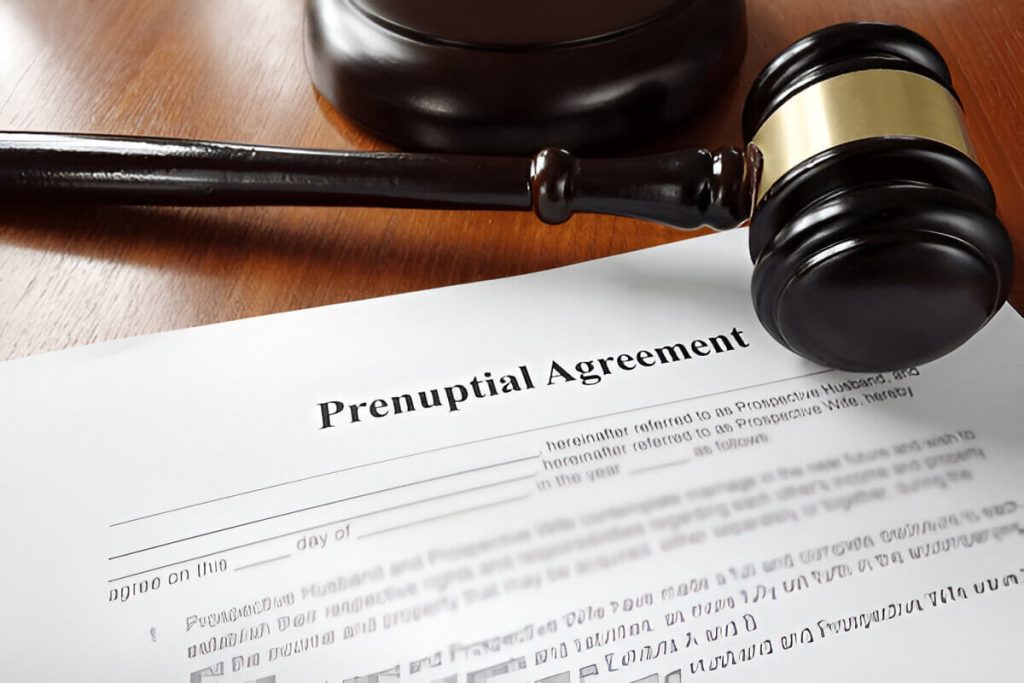What is a Prenup? Understanding the Benefits and Implications of Prenuptial Agreements

In today’s complex marriage and finance world, prenuptial agreements, or prenups, have become essential for many couples. These contracts outline asset division and financial responsibilities if the marriage ends in divorce. This text explores their history, reasons for use, typical components, cultural approaches to marital contracts, and compares prenups with postnuptials. Whether considering a prenup or curious about its implications, this guide offers valuable insights into this aspect of marital planning.
Defining a Prenuptial Agreement
A prenuptial agreement, often referred to as a “prenup,” is a legal contract entered into by a couple before they get married. This agreement outlines the division of assets and financial responsibilities in the event of a divorce or separation. Understanding the prenup meaning is essential for couples considering marriage, as it helps clarify financial expectations and protects individual assets.
The prenuptial agreement definition encompasses various aspects, including property rights, debt obligations, and spousal support terms. By clearly defining these elements before marriage, both parties can enter the union with transparency and peace of mind.
In essence, a prenup serves as a marriage contract that provides legal safeguards for both individuals. It ensures that personal and shared assets are managed according to mutually agreed-upon terms. While some may view prenuptial agreements as unromantic or pessimistic, they can be an important tool for fostering open communication about finances and future planning between partners.
The Historical Background and Evolution of Prenups

Prenuptial agreements, often referred to as prenups, have a long and varied history that reflects the evolution of marriage and property laws across different cultures. The history of prenuptial agreements can be traced back to ancient times when they were primarily used to protect family wealth and ensure lineage continuity. In ancient Egypt, for instance, marriage contracts detailed the financial arrangements between spouses, safeguarding assets in case of divorce or death.
As societies evolved, so did the complexity and purpose of prenups. During the Middle Ages in Europe, these agreements became more formalized as part of dowry arrangements. They served not only as a means to secure financial stability for women but also as tools for political alliances and social status enhancement.
The evolution of prenups took a significant turn in the 19th century with changes in property rights laws. As women gained more legal rights over their property and earnings, prenuptial agreements began to reflect these societal shifts by providing both parties with protection against potential financial disputes.
In contemporary times, prenups have become increasingly common across various cultures. They now address a wide array of issues beyond just financial matters (such as intellectual property rights and custody arrangements) reflecting modern relationships’ complexities. This historical context highlights how prenuptial agreements have adapted over time to meet changing societal needs while continuing to serve as important legal instruments for couples entering marriage.
Key Reasons Couples Choose to Get a Prenuptial Agreement
A prenuptial agreement, commonly referred to as a prenup, is becoming an increasingly popular choice for couples planning to marry. While some may view it as an unromantic gesture, there are several compelling reasons for a prenup that highlight its practical benefits.
One of the primary reasons couples opt for a prenuptial agreement is financial protection in marriage. A prenup allows both parties to clearly define their financial rights and responsibilities, ensuring transparency and understanding from the outset. This can be particularly beneficial if one or both partners have significant assets or debts prior to entering the marriage.
Another key benefit of prenuptial agreements is asset protection during divorce. In the unfortunate event of a separation, a prenup can help safeguard individual assets by specifying how they should be divided. This not only protects personal wealth but also minimizes potential conflicts and legal disputes.
Additionally, prenuptial agreements can offer peace of mind by addressing issues such as spousal support and estate planning. By preemptively discussing these matters, couples can prevent misunderstandings and ensure that both parties’ interests are adequately protected.
While every couple’s situation is unique, understanding the benefits of prenuptial agreements can empower partners to make informed decisions about their financial futures together.
Main Components and Clauses Typically Included in a Prenup
When considering a prenuptial agreement, it’s essential to understand the main components and clauses typically included to ensure both parties’ interests are protected. Prenup clauses serve as the foundation of these agreements, outlining the financial and legal expectations before marriage.
One of the primary components involves asset division, which specifies how property and assets will be distributed in the event of a divorce. This includes identifying separate vs. marital property to prevent disputes later on. Another critical element is debt responsibility, where both parties agree on who will be responsible for pre-existing or future debts.
Spousal support provisions are also common in prenups, detailing whether alimony will be paid and under what conditions. Additionally, prenups may include inheritance rights to protect family heirlooms or future inheritances from being divided during a separation.
It’s crucial to include clear legal provisions in prenups that comply with state laws to ensure enforceability. Consulting with legal professionals when drafting these agreements can help tailor them to specific needs while maintaining fairness and legality.
How to Draft and Enforce a Valid Prenuptial Agreement
Drafting and enforcing a valid prenuptial agreement involves a structured process that ensures both parties are protected and the agreement is legally binding. The first step in the drafting a prenup process is to seek legal advice from an attorney who specializes in family law. This ensures that the document meets all enforceable prenuptial agreement requirements and complies with state laws.
An enforceable prenuptial agreement must be entered voluntarily by both parties, without any duress or coercion. Full disclosure of each party’s assets, liabilities, and financial situation is crucial to prevent future disputes over hidden assets. The document should be clear, specific, and fair; courts are more likely to uphold agreements that do not leave one party at an extreme disadvantage.
Additionally, it’s important to ensure that both parties have sufficient time to review the document before signing it. Rushed agreements can be deemed invalid if one party argues they did not have adequate time for consideration or legal consultation.
Once drafted, each party should review the prenup with their respective attorneys before signing it in front of a notary public. This step further solidifies its validity by demonstrating that both parties understood the terms fully.
By following these steps and obtaining proper legal advice for prenups, couples can create a robust prenuptial agreement that provides clarity and security for their future together.
Prenups Around the World (How Different Cultures Address Marital Contracts)
Prenuptial agreements, often referred to as prenups, serve as a practical tool for couples to outline financial and property arrangements before marriage. However, the perception and implementation of these contracts can vary significantly across different cultures. Understanding prenuptials globally reveals fascinating insights into how various societies approach marriage and financial planning.
In the United States, prenups are commonly used to protect individual assets and clarify financial responsibilities. They are widely accepted as a pragmatic step for couples entering marriage, particularly where there is a significant disparity in wealth or when one or both parties have substantial assets.
Meanwhile, in many European countries such as France and Germany, marital contracts are deeply embedded in the legal system. In France, for instance, couples can choose from several matrimonial regimes that determine how assets will be managed during the marriage and divided upon divorce. This level of customization reflects a cultural view that values clear legal frameworks within personal relationships.
Contrastingly, in countries like India and China, prenuptial agreements are less common due to cultural views on prenups that emphasize family ties over individual contracts. In these societies, marriages are often seen as unions between families rather than just individuals; thus, financial matters may be handled more informally through family discussions rather than formalized agreements.
In recent years though, globalization has led to increasing awareness and acceptance of prenuptials globally. As more people marry across borders or live internationally mobile lives, international comparisons on marital contracts become essential for ensuring fair arrangements that respect diverse cultural norms while providing legal protection.
While prenuptial agreements differ widely around the world due to varying cultural attitudes towards marriage and finance management (ranging from formalized legal documents to informal family negotiations) they universally serve an important role in facilitating open communication about expectations within marriages.
Prenuptials vs Postnuptials (Understanding the Differences and When Each is Applicable)
When navigating the complexities of marital agreements, understanding the distinctions between prenuptial and postnuptial agreements is crucial. Prenuptials, commonly referred to as prenups, are contracts entered into before marriage. They outline how assets and financial matters will be handled in the event of a divorce or separation. This proactive approach allows couples to address financial issues upfront, providing clarity and peace of mind as they embark on their marital journey.
In contrast, postnuptials (or postnups) are agreements made after a couple has already married. These can be particularly beneficial if circumstances change during the marriage, such as receiving a significant inheritance or one partner starting a business. Postnups offer flexibility for couples who may not have considered or needed a prenup initially but find that changing dynamics warrant formalizing certain arrangements.
The decision between prenups vs postnups often hinges on timing and specific needs. Couples should consider prenuptials if they wish to establish clear expectations before tying the knot. On the other hand, postnuptials might be more appropriate for those who want to address new developments that arise after marriage has begun.
Ultimately, both types of agreements serve to protect individual interests and foster transparent communication about finances within a marriage. Consulting with legal professionals can help determine which option best suits your unique situation and ensure that your agreement is tailored to meet your needs effectively.
Should You Consider Getting a Prenuptial Agreement?
When contemplating the decision of whether to enter into a prenuptial agreement, it’s important to weigh both personal and financial considerations carefully. A prenuptial agreement, often referred to as a “prenup,” is a legal document that outlines how assets and debts will be divided in the event of a divorce. While it might seem unromantic to plan for the possibility of separation before marriage, it can serve as an essential tool for protecting both parties’ interests.
One of the primary benefits of a prenup is the clarity it provides. By clearly defining asset ownership and financial responsibilities from the outset, couples can avoid potential disputes in the future. This transparency can help reduce stress and conflict should unforeseen circumstances arise.
Additionally, prenuptial agreements are particularly beneficial for individuals entering marriage with significant assets or debts, business ownership, or children from previous relationships. In these cases, a prenup can ensure that personal or family wealth is safeguarded according to one’s wishes.
However, it’s crucial for both partners to approach this conversation openly and honestly. Consulting with legal professionals who specialize in family law can provide valuable guidance tailored to your unique situation.
Ultimately, deciding whether to get a prenuptial agreement is deeply personal and should reflect mutual understanding and respect between partners. By considering all aspects thoughtfully, you can make an informed decision that supports your future together.
